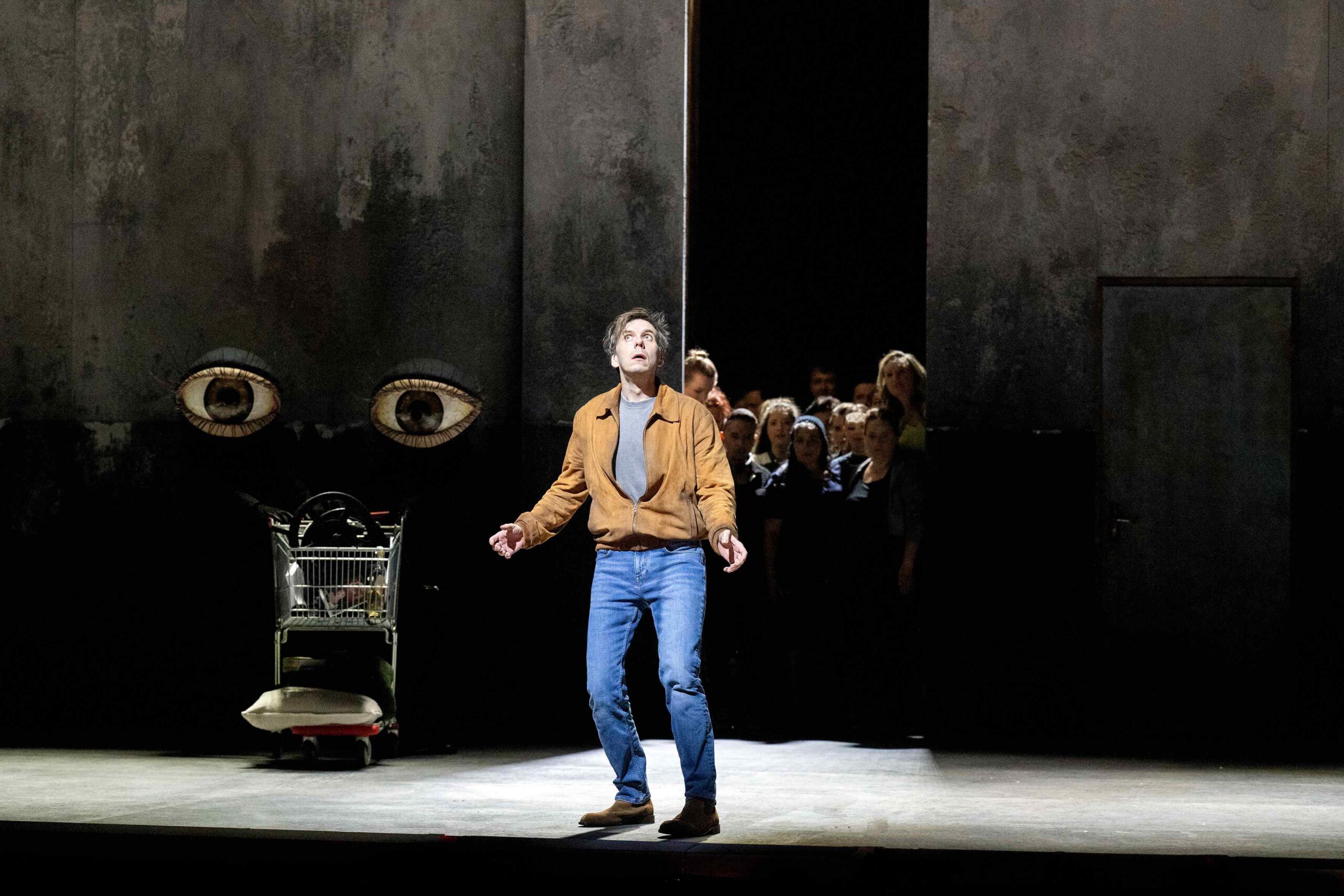Les Contes d’Hoffmann Salzburg Festival 1980 : Placido Domingo, Eda Moser José van Dam, Anne Howells, under the baton of James Levine (reprised in 1981 with Catherine Malfitano in the fourfold female incarnation) in a stage directed by Jean-Pierre Ponnelle (who – the same year – was at the Bayreuth Festival directing the most wonderful production of Tristan and Isolde imaginable.)
Les Contes d’Hoffmann Salzburg Festival 2003: Neil Shicoff, Ursula Pfitzner, L’ubica Vargicová, Krassimira Stoyanova, Waltraud Meier, Ruggero Raimondi, Angelika Kirchschlager, under the baton of Kent Nagano and under musical direction of David McVicar.
The multiplicity of versions and the choice of critical edition by Michael Kaye and Jean Christophe Keck
It is well known that Les Contes d’Hoffmann is an unfinished work because Offenbach died (5 October 1880) before the first performance of the work (10 February 1881). He left many writings and sketches that later allowed to establish various versions of this posthumous opera. Some authors count more about ten, including those of Oser, Bonynge, Nagano, Kaye and Keck
In the multiplicity of versions, the critical edition by Michael Kaye and Jean Christophe Keck (chosen for this production) fruit of important research, can undoubtedly appear as the closest to what we can imagine that were the intentions of the composer
The female roles of Stella, Olympia, Antonia and Giulietta performed by one single singer imply that Giulietta’s role is not – as traditionally in the Choudens version – entrusted to a mezzo-soprano but rather to a lyric soprano (even dramatic) colorature.
The selected edition includes two verses for the duo Lindorf-Hoffmann at the prologue («Et par où votre diablerie… »/ »Where does sincere friendship come from…. » Nicklausse’s air from the first act : «Ô rêve de joie et d’amour» precedes «Voyez la sous son éventail» and in the second act «Vois sous l’archet frémissant». The Venice act is the one that has been the subject of the most profound rearrangements: Dapertutto no longer sings «Scintille diamant» but « Répands tes feux dans l’air». There is no septuor (by the hand of Raoul Gunsbourg) and Giulietta is endowed with an air particularly «adorned» with «L’amour lui dit la belle ». And of course at the epilogue the air of the muse «Des cendres de ton coeur » precedes the final apotheosis with chorus «On est grand par l’amour et plus grand par les pleurs ».
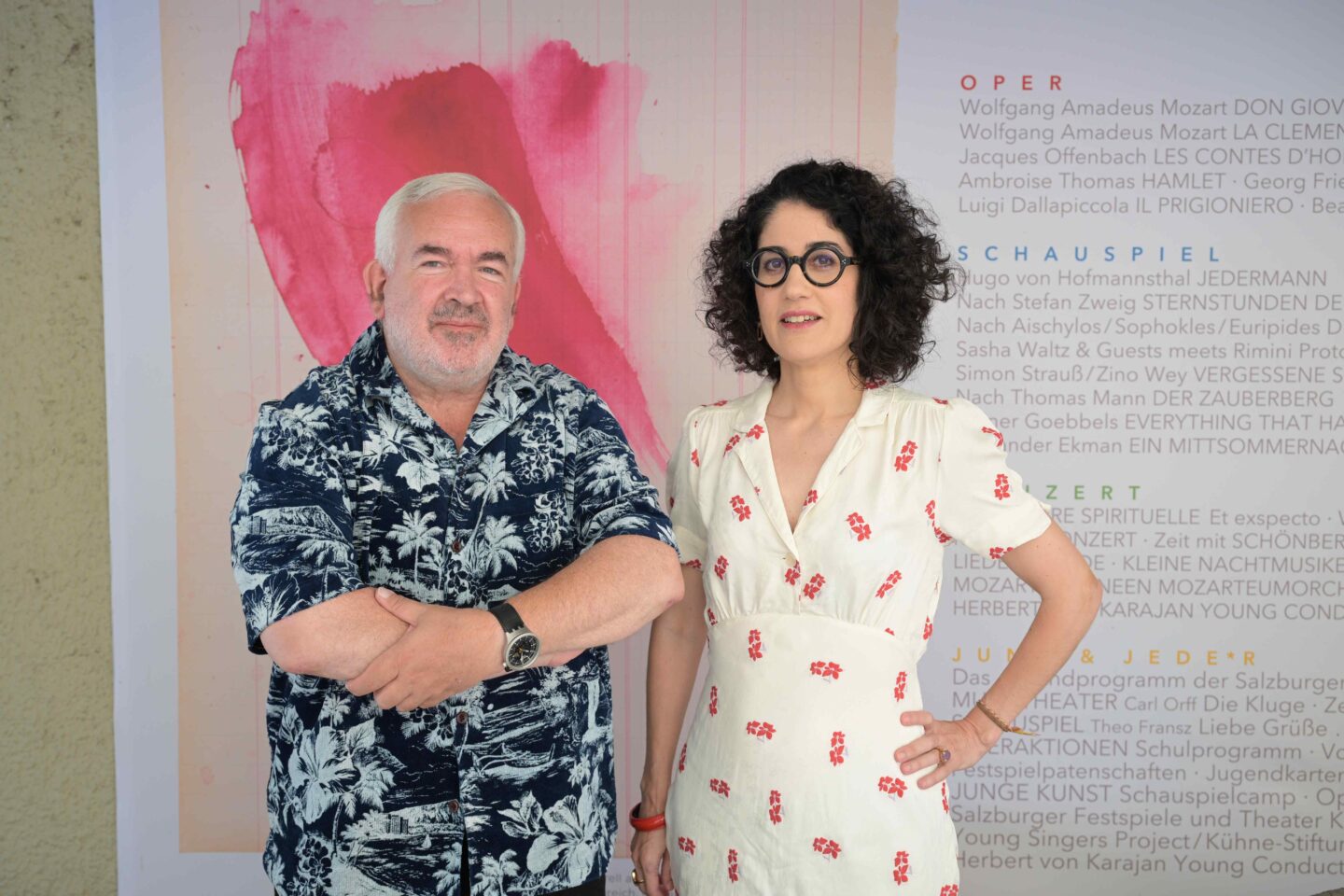
A confusing staging very too complicated
The staging of Mariame Clément is intended, once again, a « mise en abyme» with notably the idea (too) often exploited of the «theatre in the theatre» or more precisely here of the «cinema in the theatre». A process that necessarily encounters certain limits which we have repeatedly measured in multiple productions during which we were able to see that the process was quickly short-circuiting.
We were talking about the limits of the «regietheater» in our report on Hamlet and here we find the obvious demonstration.
In his remarks Mariame Clément indicates that Stella is the most important woman in Hoffmann’s life. Antonia, a young artist who later became the star Stella, is doing “the career that Hoffmann did not do”. This upset love causes in Hoffmann sadness, resentment and despair. Olympia, the very young girl, will play in Hoffmann’s first film and, unable to express herself, comes to rebel against all the assigned shackles. As for Giulietta, she is at the center of a hazy and nightmarish story, as well as paranoid: like the projection of all the failures and all the misfortunes of Hoffmann…
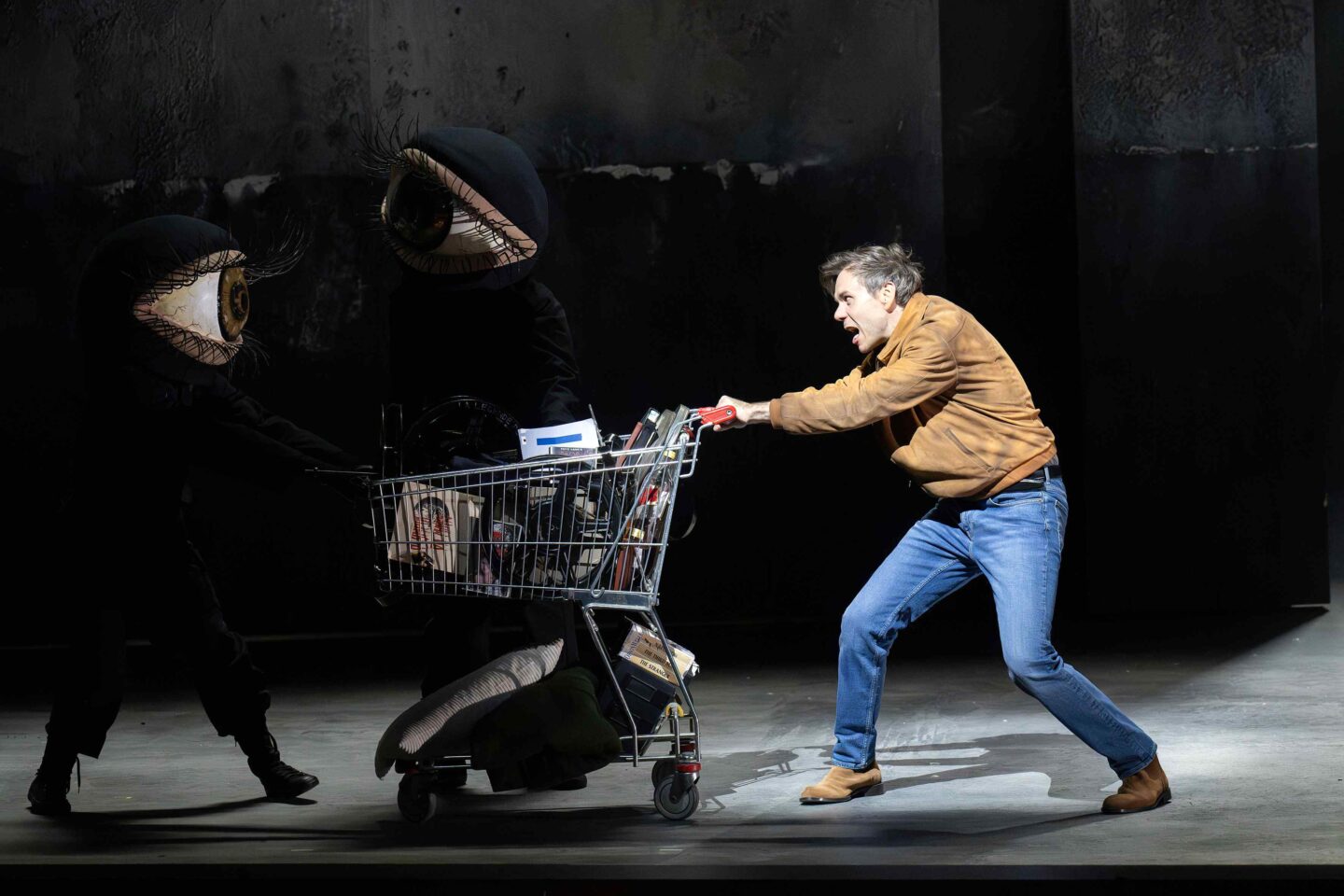
It certainly retains the principle of flashback but in the “updating” for the occasion. It is therefore a «closeted» Hoffmann who will revive before our eyes his journey through the world of cinema at various times. When the opera begins Hoffmann, in jeans and brown jacket, pushes a shopping cart cluttered with film accessories including cameras and film reels. This caddie flanked by a pillow serves as a night shelter. He stops in front of the walls that are supposed to be those of a film studio and drowses not far from the garbage. From one of them emerges the muse (in the text it is supposed to emerge from a well). Then we see them integrate the meal inside the canteen of the studio during which Hoffmann will narrate the adventures of a career first as an assistant (with the episode of Olympia) and then as a director (with the episode of Antonia). The two heroines appearing successively on a set during a shoot. When he mentions : «Stella, trios femmes dans la même femme, trio d’enchanteresses qui se partagèrent mes jours » he searches for the videos in his stock and all the characters of the tavern, unrolling the film, watch the film that will lead them into the story of Olympia (before the evocation of Kleinzach will be projected on the wall).
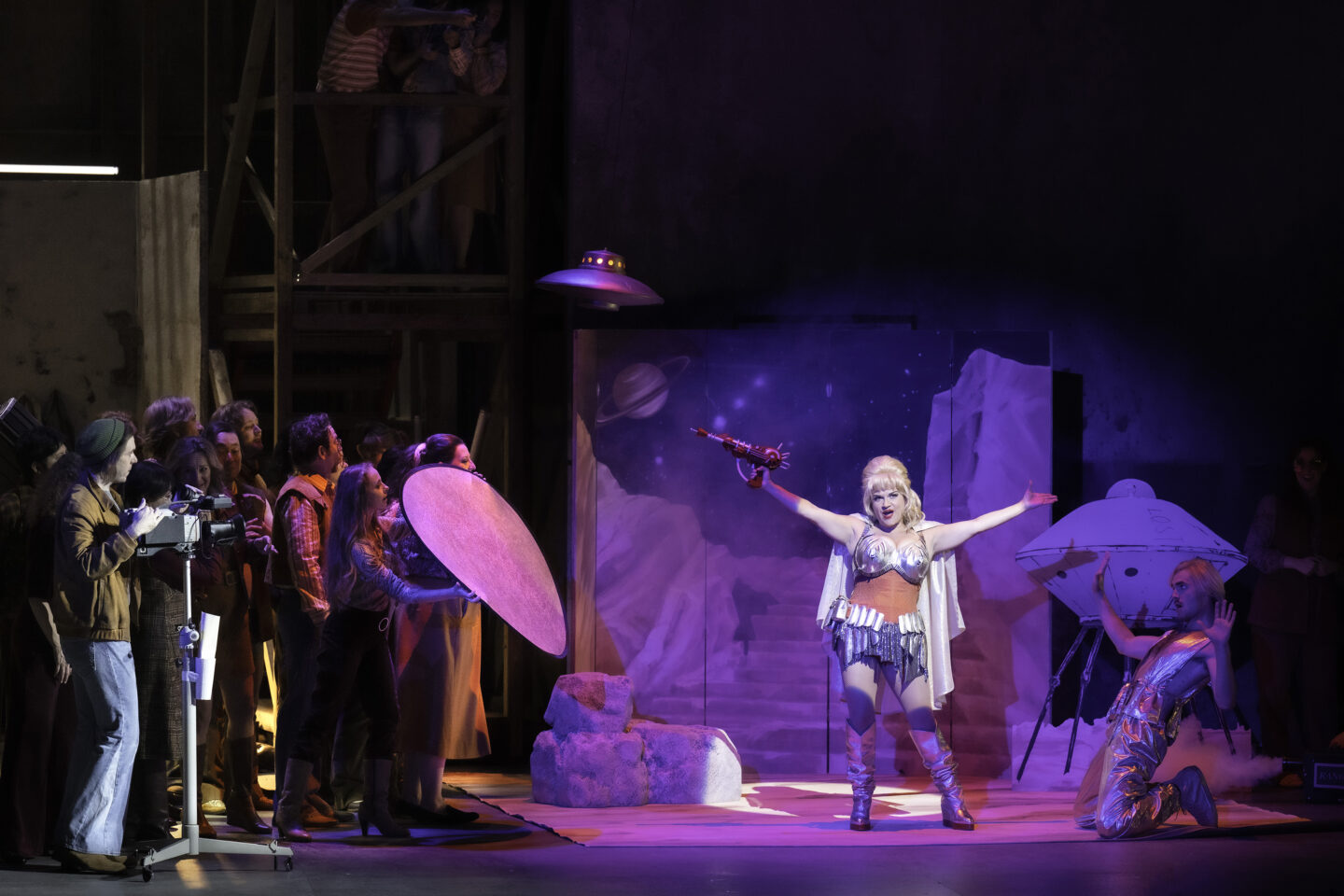
The episode of Olympia is set in the 1970s at the time of hippies (with clothing accordingly: trousers with elephant feet and long hair).
Olympia is a young girl wearing a plaid skirt, white blouse, blonde pigtails, who reads comics while chewing gum. For the shooting of a film in which Hoffmann is the assistant, Mariame Clément transforms the automaton-doll into the heroine of an anticipation film, in this case Barbarella (by Roger Vadim). As a result, it is difficult to refer to the traditional version because the notion of automaton no longer exists! Perhaps we can keep the illusion of a «young woman-doll» which is only the fruit of the imagination of the hero.
But this is probably the case when “pulling things by the hair” and when Hoffmann, in the middle of the party, will drag her into one of the booths, she will accuse her – gestures to support it – by coming out of having abused her. This act ends in a way that is almost incomprehensible to the text.
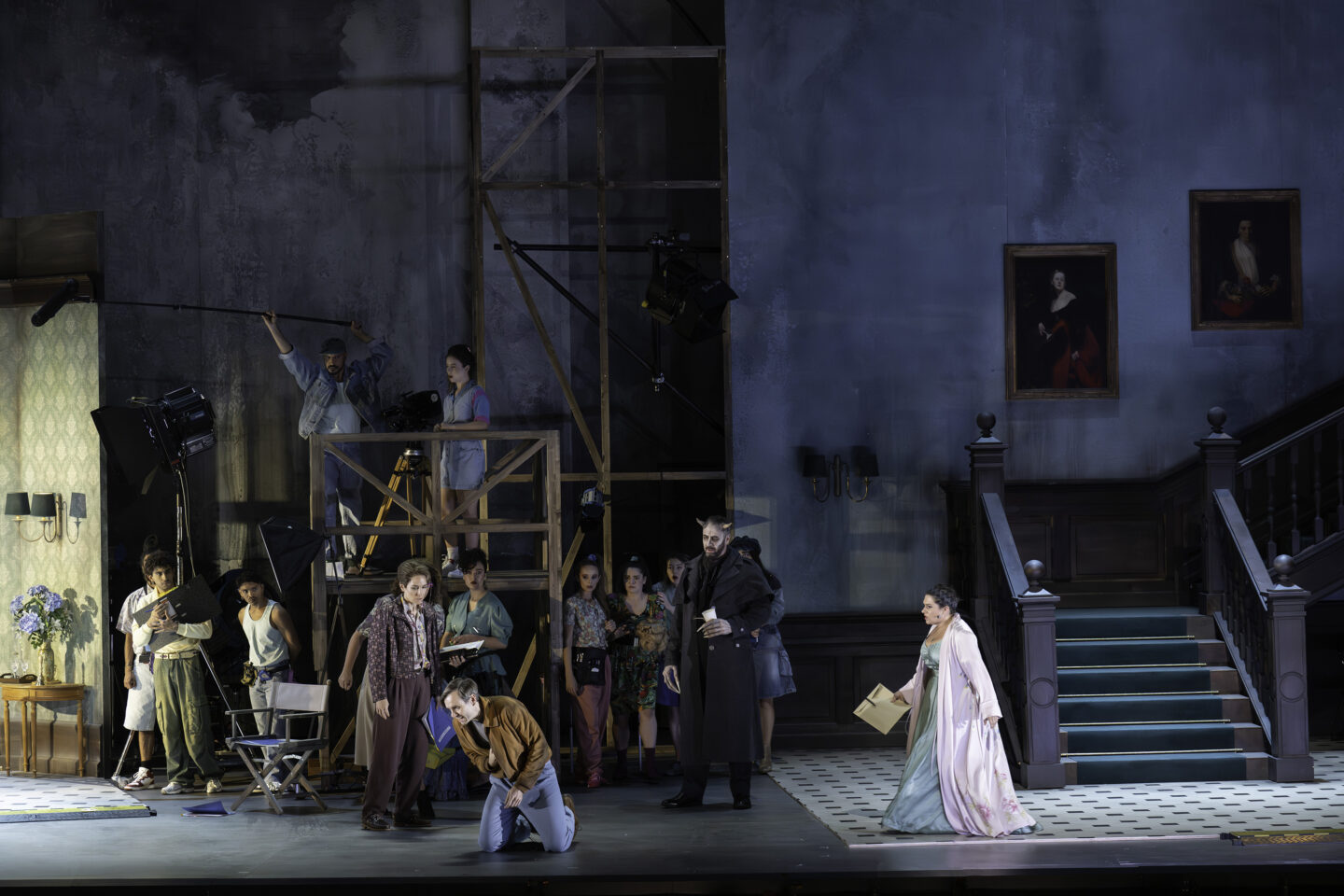
Mariame Clément complicates his task by splitting the character of Hoffmann in the act of Antonia, assigning him sometimes the role of director who directs the film sequence and sometimes that of the lover of Antonia… also coveted by a rival producer of Hoffmann and our hero will conceive spite and pain! She tries to move from the shooting to real life with several plans of play and intentions, which make her reading at least confusing.
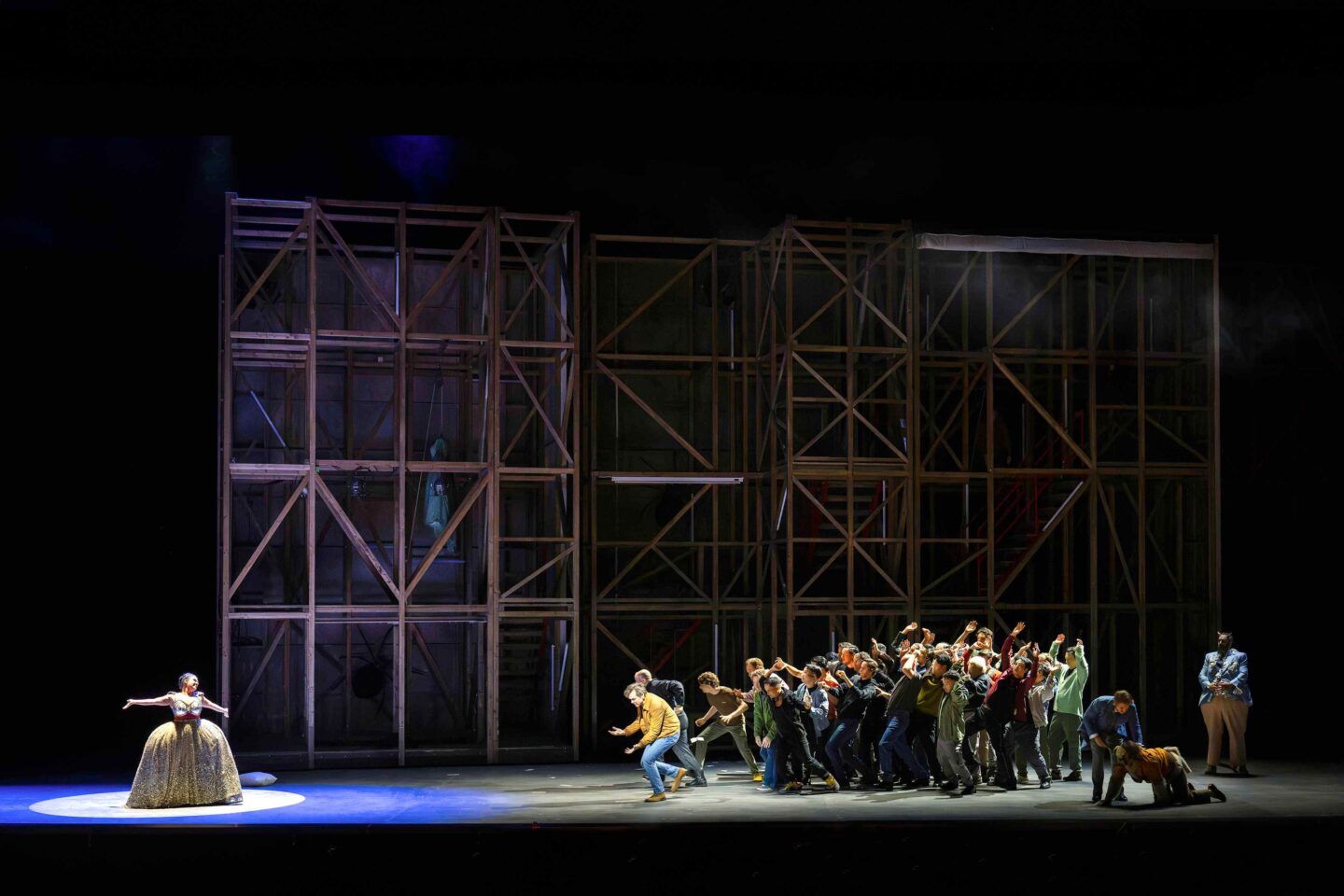
The Venice Act no longer appears in a specific place but in a kind of neutral and relatively unstructured setting. It is true that these are the three stories of the one who is, without doubt, originally the most esoteric: Giulietta representing probably the burst female fantasies of Hoffmann.
The difficulty of staging Mariame Clément is also due to the fact that she does not intend to leave any space for freedom to the spectators and considers that it must imperatively tell in extreme detail only one story (and in this case four stories) : his without leaving any blank. In doing so, by this «too full» she paradoxically empties the work of Offenbach of its poetic substance.
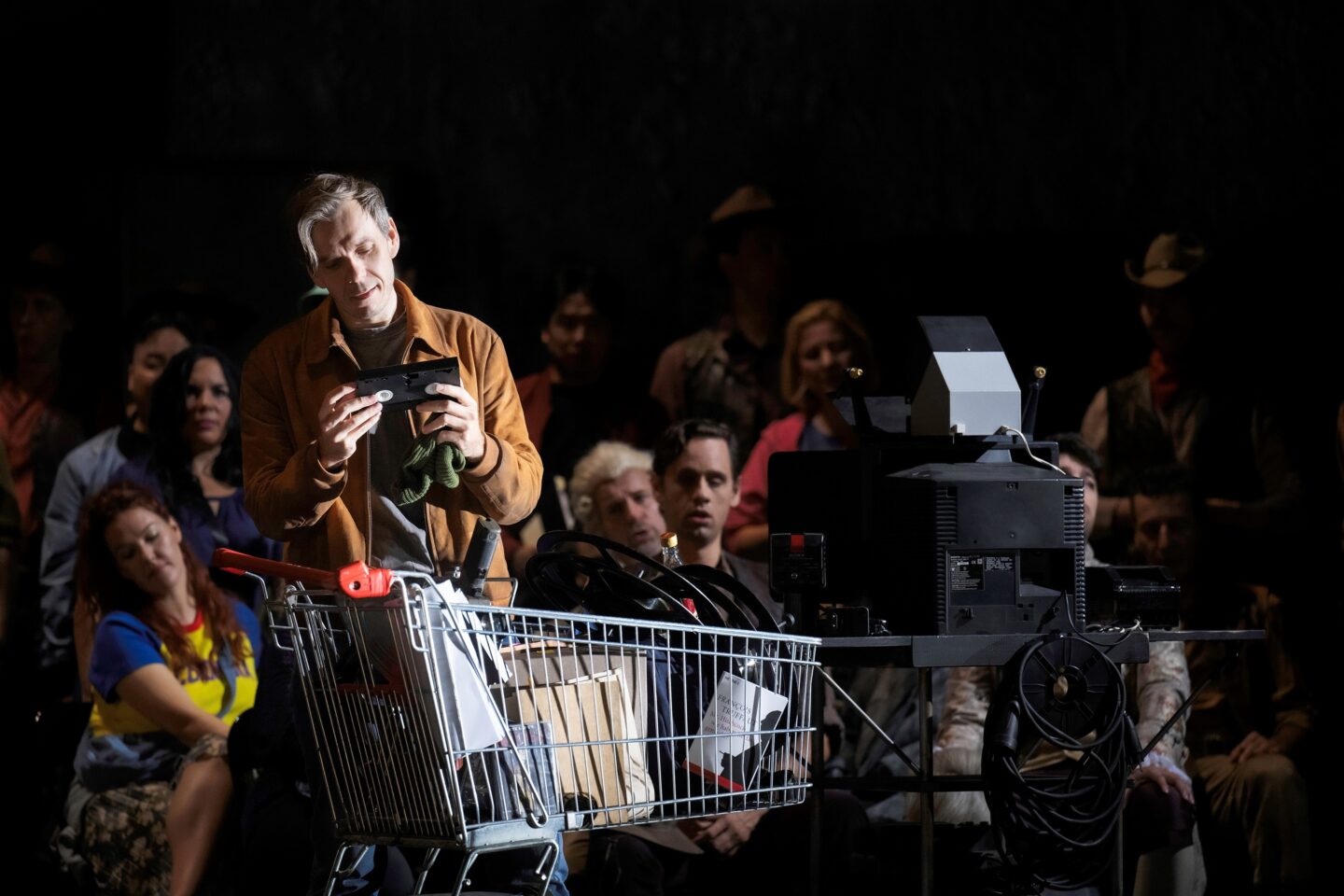
A cast dominated by tenor Benjamin Bernheim
The Franco-Swiss tenor Benjamin Bernheim finds in Hoffmann the ideal job. Note that he has already performed this role in particular at the Staatsoper of Hamburg in 2021 in the direction of Daniele Finzi Pasca and then at the Paris Opera in December 2023 in the production of Robert Carsen. He will again wear the clothes of Hoffmann at the Metropolitan Opera in the staging of Bartlett Sher from 24 September (broadcast on 5 October).
Exceptional musician (he was already appreciated last season in Roméo et Juliette at the Paris Opera, directed by Thomas Joly), he is also an eminent specialist of French melody (he will come, to perform a cycle, on February 9 at the Monte-Carlo Opera). Is it necessary to indicate that his diction and pronunciation in French are simply sublime and that we understand every word of what he sings. We can also praise the clarity of his timbre and ease in all registers, it is understood that at no time the tenor seems to force his natural means, which seems to augur the pursuit a career that has been conducted with discernment and extreme intelligence and which should be long-term. In an interview he has also opportunely pointed out that he had carefully waited to sing this role, which is long and difficult, to have the maturity, color and strength.
What a particularly gifted actor in view of the complexity of the stage: a real theatre actor or even cinema!
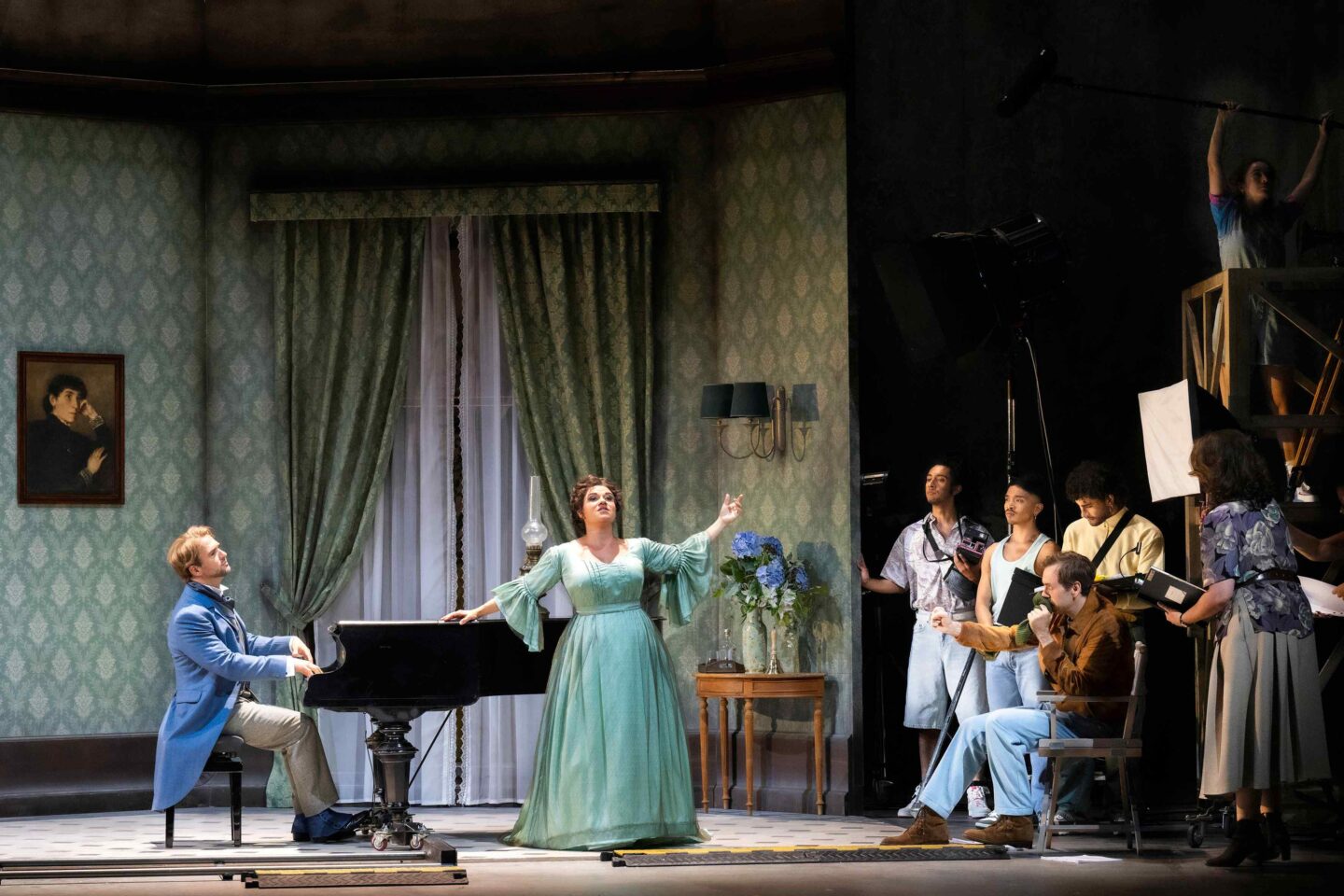
Kathryn Lewek (heard at the Nice Opera in Lucia di Lammermoor and Lakmé) embodies the four female roles with her well-known courage and endurance that makes it (on the same stage Eda Moser and Catherine Malfitano had also performed these four roles four decades ago under the direction of Jean-Pierre Ponnelle). She brilliantly performs the voices of Olympia and sings beautifully Antonia showing herself at ease in the particular difficulties of the role of Giulietta.
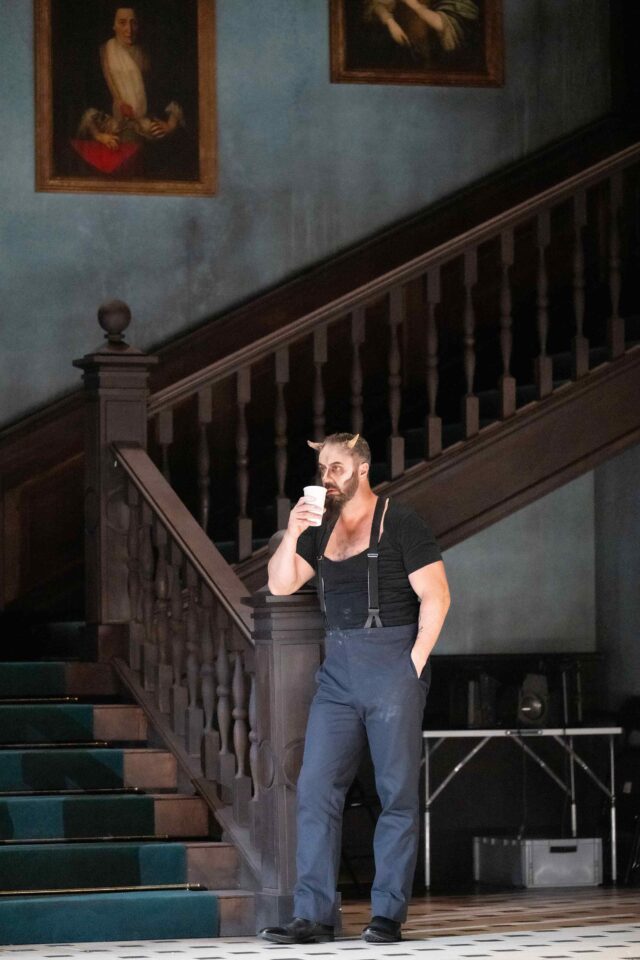
Also an impeccable performance in the four diabolical incarnations of Christian Van Horn (recent Don Quixote de Massenet l’Opéra de Paris) with a beautiful low texture, even if the French pronunciation is less obvious than that of its main partners.
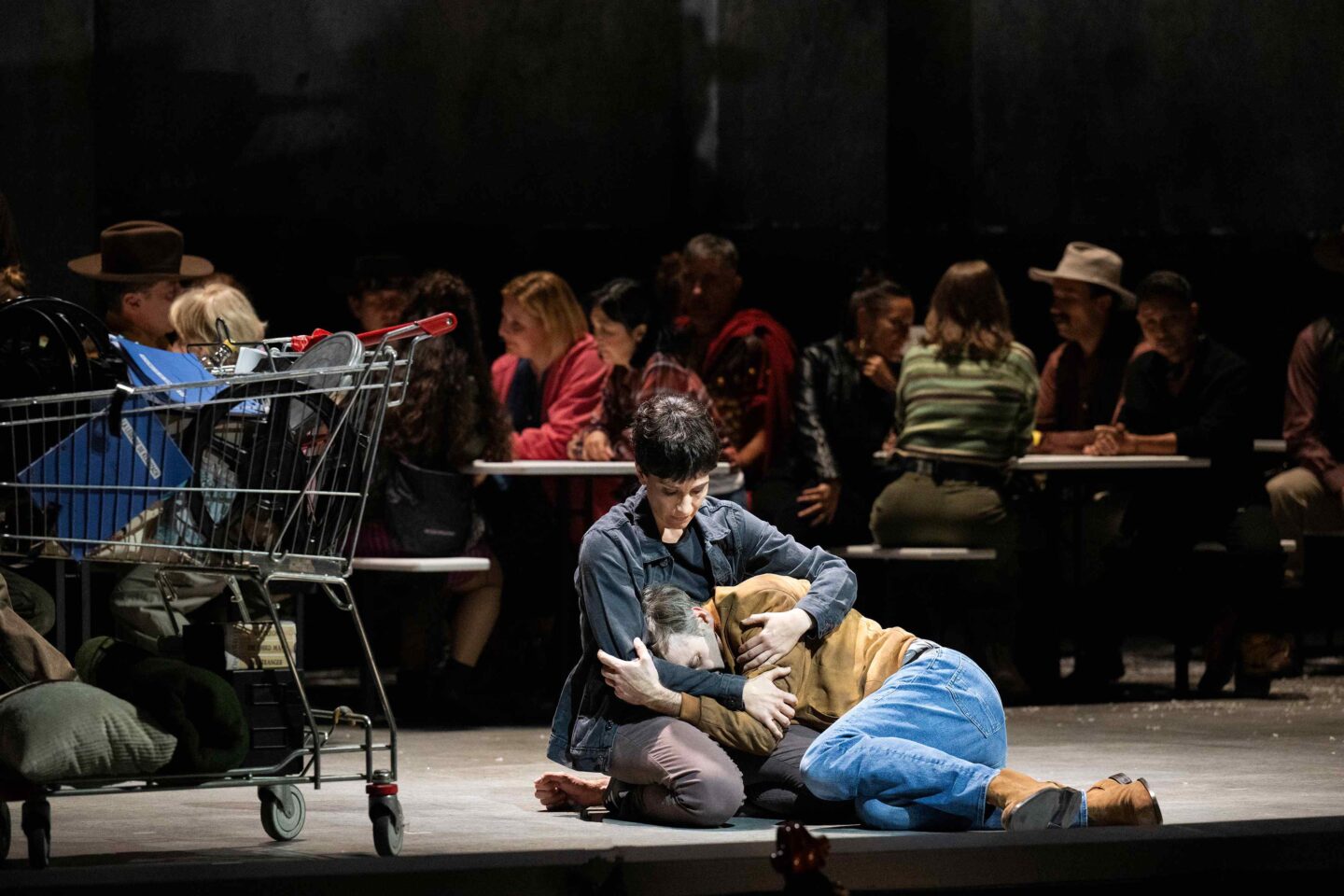
Kate Lindsey (The Muse/ Nicklausse) has no lack of qualities but in the vast ship of the «Grosses Festspielhaus» her voice is difficult to pass easily. There are weaknesses in some of the secondary roles. We should mention, however, Géraldine Chauvet in the voice of Antonia’s mother and Marc Mauillon particularly convincing in the roles of the four valets.
The surprise came from a direction sometimes less inspired than usual by Marc Minkowski, but specialist of the work (and especially of this version) with shift with the orchestra
Christian Jarniat
August 21, 2024
Conductor: Marc Minkowski
Regie: Mariame Clément
Set and costume: Julia Hansen
Lights: Paul Constable
Video: Etienne Guiol, Wilfrid Haberey
Choreography: Gail Skrela
Dramaturgy: Christian Arseni
Distribution:
Hoffmann: Benjamin Bernheim
Stella/Olympia/Antonia/ Giulietta: Kathryn Lewek
Lindorf/ Coppélius/ Dr. Miracle/ Dapertutto: Christian Van Horn
The Muse/ Nicklausse: Kate Lindsey
Andrès/ Cochenille/ Frantz/ Pitichinaccio: Marc Mauillon
The voice of the mother: Géraldine Chauvet
Spalanzani: Michael Laurenz
Crespel/ Master Luther: Jérôme Varnier
Hermann / Peter Schlemil: Phillippe-Nicolas Martin
Nathanael: Pace Garcia
Wilhelm: Yevheniy Kapitula
Vienna Philharmonic Orchestra
Vienna Opera Choir
